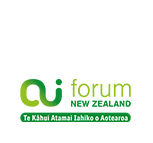Wow, we’ve had a busy month with three Connect Events across Wellington and Auckland and I hope you were able to join some of these discussions.
We began by exploring the meaningful work being done to benefit society by New Zealand women. Women in AI for Social Good was a combined event with AUT and She#. It was an inspiring, interesting and open view of the broad ways women are working in AI, how they entered the domain and their aspirations. One of the key messages woven through the discussion was the many career pathways into AI, which don’t always require highly technical backgrounds. Importantly, we know the work is made richer because of our collectively diverse backgrounds and skills.
Next, we hosted an important discussion in Wellington regarding AI in Education. There was a broad set of panelists, who delved into the hope and fears surrounding AI’s revolutionary capabilities to better education for all.
This week, we joined Minister Twyford and officials from the Ministry of Foreign Affairs and Trade (MFAT) to discuss the work currently being undertaken to lead policy and regulation of Autonomous Weapons Systems. It was a fascinating discussion and I was thrilled with the conversation and points raised by our audience and members. If you didn’t make the event you can read Minister Twyford’s speech here.
Sometimes, it can be difficult to articulate all the work the AI Forum does on behalf of the community, but Minister Twyford has summed up some of our impact beautifully.
“In fact, the AI Forum has been a number of steps ahead of the New Zealand government on this issue for some years now. Through your endorsement of the pledge you have already called on governments and government leaders to create a future with strong international norms, regulations and laws against lethal autonomous weapons. And, in the absence of such rules, you have pledged to “neither participate in nor support the development, manufacture, trade, or use of lethal autonomous weapons.
This leadership is welcome – not least because you represent a group of experts, entrepreneurs and others who truly understand the issues in play and have a better sense than anyone of the future we face if there are no effective controls on such weapons.
It is also welcome because you can make such a positive contribution to our efforts to achieve these controls. From ensuring that regulation is accurate and future proof, to providing ideas on how to tackle some of the biggest challenges ahead – including compliance and verification – there are important roles that the AI community can fill in the articulation of New Zealand’s policy on autonomous weapons systems. Your expertise and experience – and of course your ability to translate complex technical issues into policy – will be invaluable as we move forward,” he said.
Meanwhile, MFAT are continuing their consultation process and if you would like to contact them to provide your own feedback please let me know.
The World Economic Forum (WEF) has released Nine ethical AI principles for organizations to follow. The WEF highlights there is a vast and continually growing landscape of ethical principles (we also wrote our own high level principles last year) but WEF have analysed over 200 principles and consolidated them into nine core principles.
“Tracking the principles by company, type of organization, sector and geography enables us to visualize and capture the concerns around AI that are reflected, and how they vary across these groups. These can be translated and contextualized into norms and practices, which can then be governed. These core ethical AI principles are derived from globally recognized fundamental human rights, international declarations and conventions or treaties — as well as a survey of existing codes of conduct and ethical principles from various organizations, companies and initiatives,” says the report.
While on the subject of principles, this article about the OECD Paving The Way Towards Trustworthy And Responsible AI is worth a read.
During our Aotearoa AI Summit last month, we held roundtable discussions to help shape the proposed cornerstones of the National AI Strategy. I would like to thank all of you who provided valuable feedback, guidance and provide an update. Subsequently, as a result there have been changes made to the cornerstones. We will share these with you soon. To further fine tune, we will be hosting a series of virtual discussions so we can continue to input your views. We will be in touch with more information on how you can participate soon, and I look forward to more great work from you, our community.
Have you been experiencing challenges with accessing talent and recruiting staff through immigration pathways? NZTech is working hard to address these issues and needs your input. Please complete the Digital Skills (other critical workers) Immigration Survey here. The aim is to help enable easier, faster access to the tech talent needed to support New Zealand’s digital transformation and economic recovery. Please make sure you respond so we have the data needed to enable these improvements.
Share your views by 5 July and join the discussion at NZTech’s Connect Event – Addressing the Tech Talent Shortage on 1 July in Auckland.
In other news, AI is to be used to tackle the most deadly parasitic diseases in the developing world. Meanwhile, in Hawaii new real-time forecasting models have been developed to predict threatening large waves on Maui’s coast, erosion and wave-driven flooding.
Kia whakatōmuri te haere whakamua.
Emma






